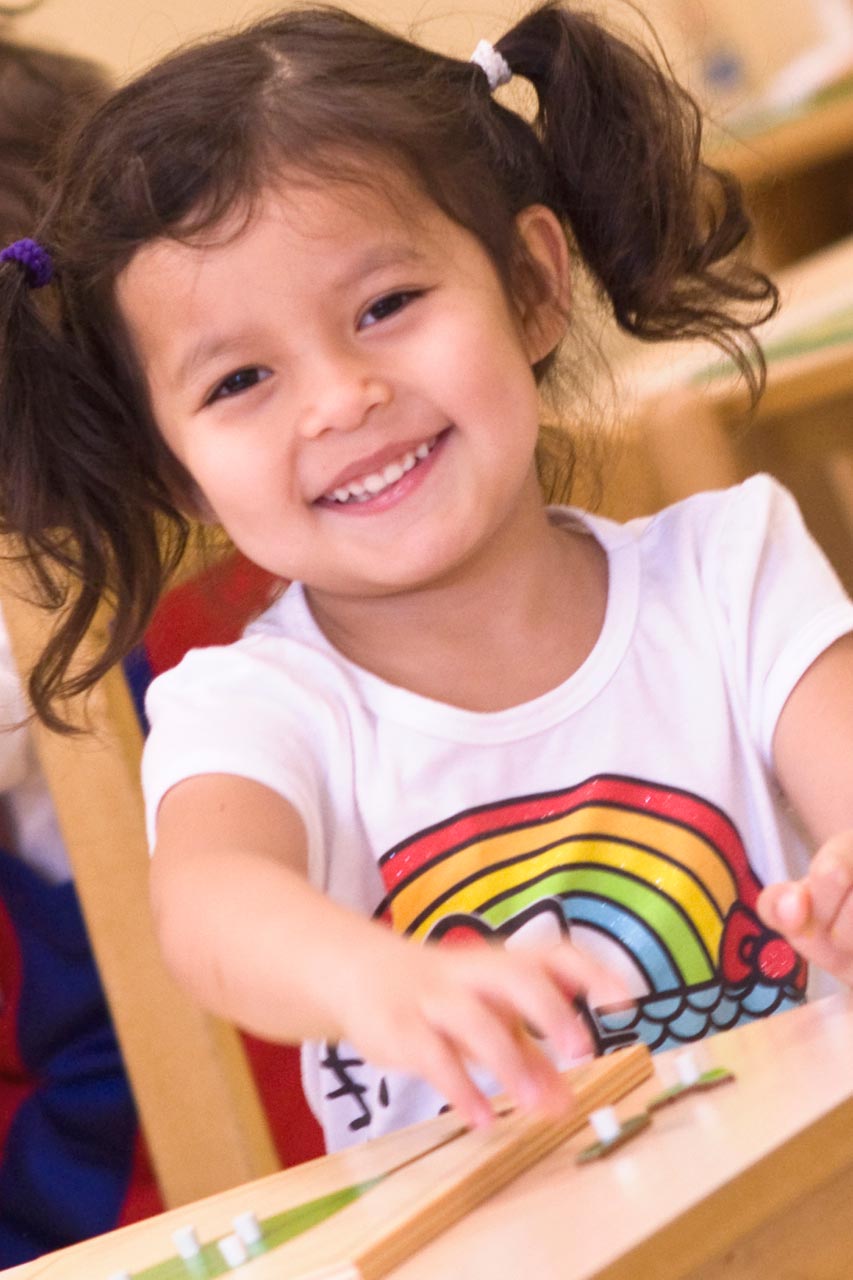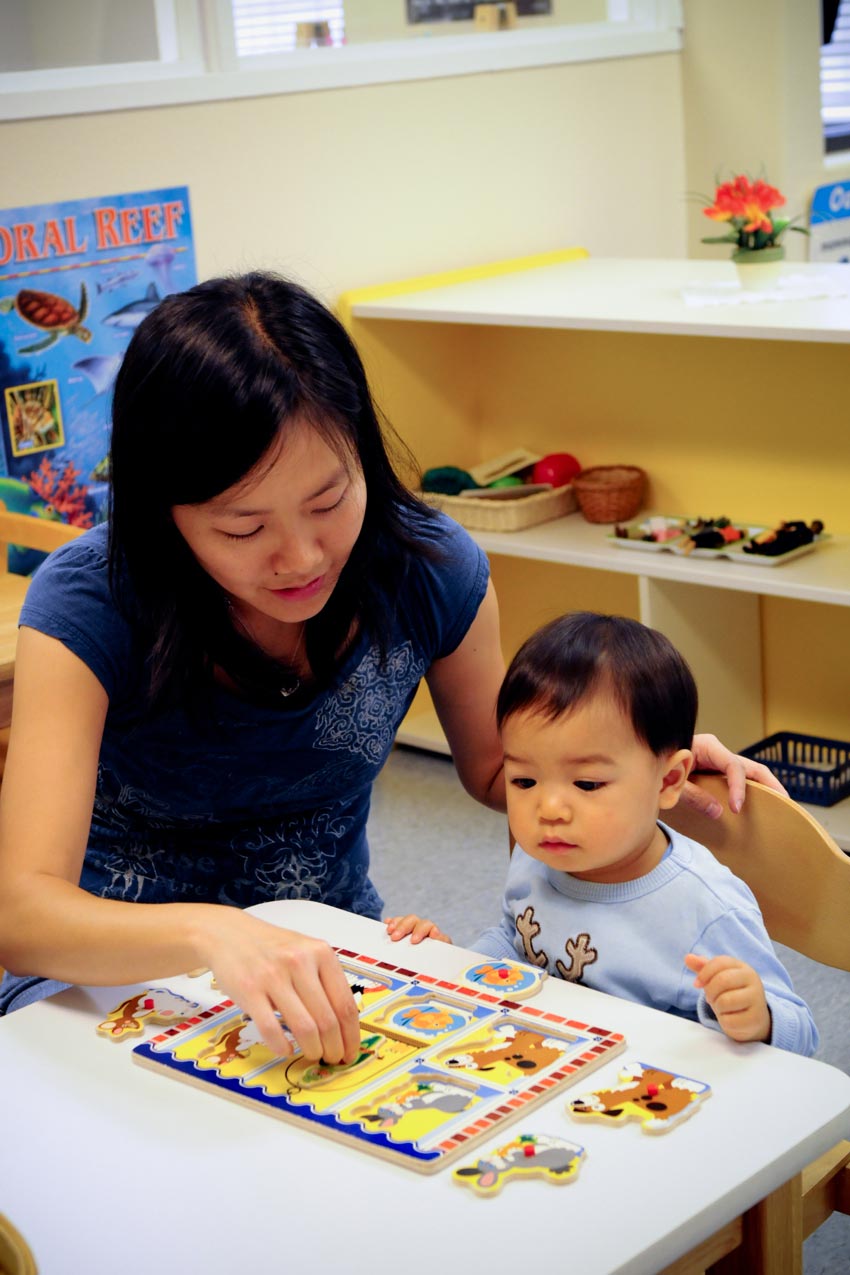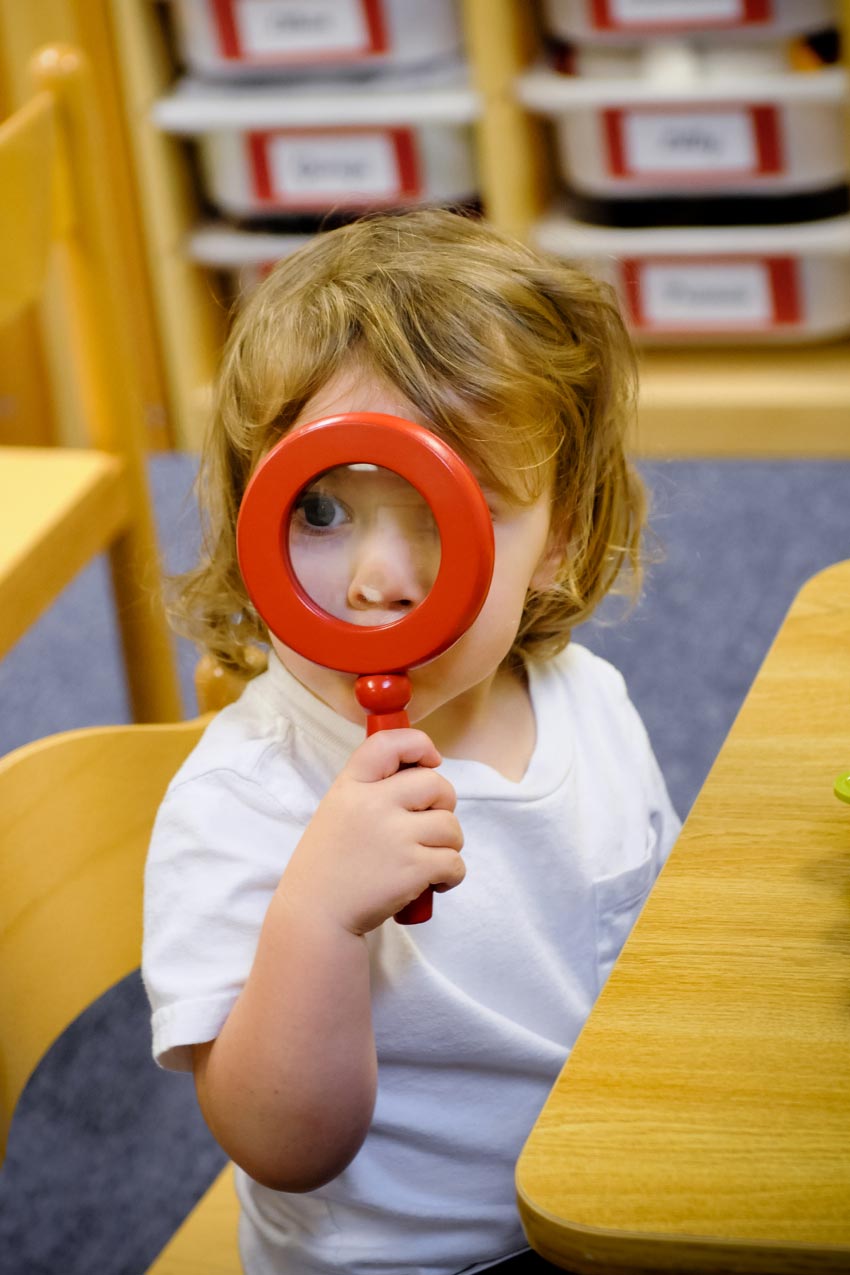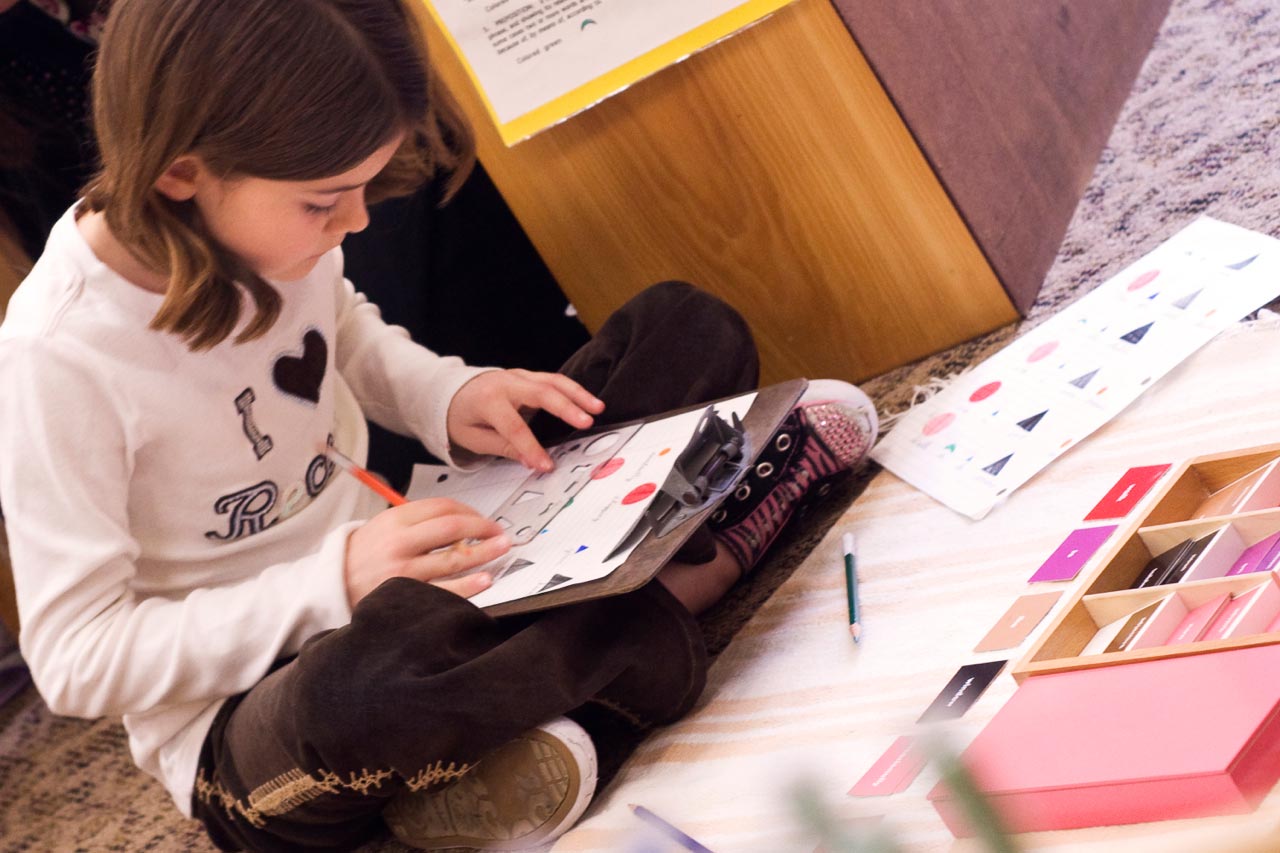When to start preschool: why earlier may be better
When is the right time to start your child in preschool?
Often, the answer depends on your personal circumstances: if you have the opportunity to stay home with your child; if you have the time, energy and knowledge to create a stimulating, orderly, Montessori-like environment in your home; and if you are able to enrich your child’s experience with regular excursions out into the world, it may well make sense to delay preschool until your child is around 3 years old.
On the other hand, if your child will be in someone else’s care, it might as well be a quality preschool, rather than merely a safe, fun daycare setting!
Here are a few questions to consider, as you make your daycare decision:
-
- Will your child be in an environment optimized to meet a toddler’s unique needs? Toddlers are at a prime age for learning, and everything in them is oriented towards this need. Yet all to often, a toddler’s needs for order and exploration are perceived not as natural opportunities for them to grow, but as challenging obstacles for parents and other adults (think tantrums, constant “no’s”, hyper-activity, and toilet training struggles!) Dr. Montessori observed that many of the allegedly abnormal behaviors toddlers exhibit occur because their needs aren’t being met. Toddlers want to be independent, yet our homes make it hard for them to be (think adult-sized sinks, toilets, shelves; adult-paced transitions like getting out of the house or rushing through a grocery store!)
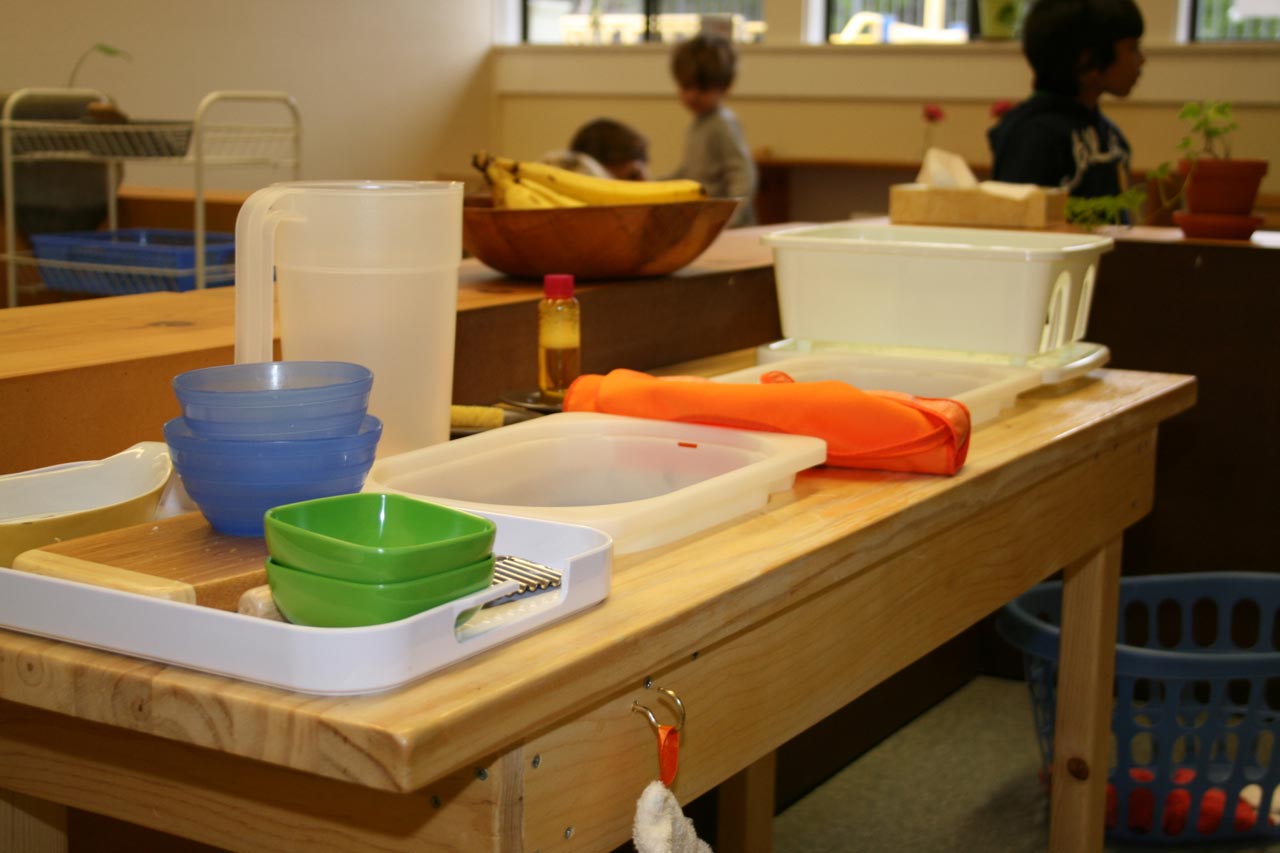
Toddlers’ brains are growing, and need mental stimulation just as urgently as nutritious food, yet often, parents, grandparents and daycare providers aren’t educators and don’t have the knowledge to consistently provide optimal mental nutrition for toddlers (think noisy plastic toys, too much stuff in overloaded boxes, TV time, and constant adult-led activity.)
In contrast, an authentic Montessori toddler program is carefully designed around the child’s needs and offers much more than just daycare. The physical environment is child-sized, with low sinks and toilets, low open shelves with a few, carefully selected activities displayed so children can easily access them. The daily routine is slow-paced, which allows a toddler to do much more for himself: for example, snack time may well take 45 minutes, during which the children set the table, serve themselves, eat with their friends, and clean up afterwards. The activities selected have specific learning objectives. Usually, they are made from wood and other high-quality materials; there are no noisy plastic toys, nor is there ever any TV or video game screen time in a Montessori class! Trained Montessori teachers know just how to simplify the steps of a task so a toddler can understand it and, in fact, do it by himself.
- Will your child be in an environment optimized to meet a toddler’s unique needs? Toddlers are at a prime age for learning, and everything in them is oriented towards this need. Yet all to often, a toddler’s needs for order and exploration are perceived not as natural opportunities for them to grow, but as challenging obstacles for parents and other adults (think tantrums, constant “no’s”, hyper-activity, and toilet training struggles!) Dr. Montessori observed that many of the allegedly abnormal behaviors toddlers exhibit occur because their needs aren’t being met. Toddlers want to be independent, yet our homes make it hard for them to be (think adult-sized sinks, toilets, shelves; adult-paced transitions like getting out of the house or rushing through a grocery store!)
-
- Who will be the adults your child will model? Toddlers learn by modeling after the adults they interact with. The adult’s approach to childrearing, and her ability to consistently, kindly implement it, matter a lot, especially at this tender age. In a Montessori toddler program, trained teachers consistently follow the Montessori approach. Their aim is to enable your child’s independence; they teach self-care skills (putting on shoes, pouring water, cleaning up spills) rather than merely taking care of your child’s needs (dressing your child, serving drinks in sippy cups, spoon-feeding your child to minimize meal-time messes.) They have a support system that enables them to be calm and patient all day: they have regular breaks to recharge their energy; coverage is available when they are out sick or for them to go on vacation; they have refresher courses and workshops to ensure continuous professional development; and they have colleagues and supervisors available to help them address any situation they encounter.
- Is there a clear educational plan to ensure your child maximizes his potential during a time of rapid brain growth? Toddlers have a once-in-a-lifetime opportunity to learn a tremendous amount, effortlessly. Dr. Montessori observed that during these early years, a child’s entire being is molded: his intelligence itself is being formed! A toddler has an urgent need to learn, and a Montessori environment enables him to do so in a deliberate, systematic manner that’s often not possible in a traditional daycare setting.
-
-
- Supporting the sense of order. Young children need their environment to be predictable, orderly. Experience shows that if a child learns at age 2 to place his shoes on a mat upon coming in and to hang up his coat; if he learns to take out an activity, work with it, and replace it on its proper spot on the shelf; if he learns to sweep up crumbs he dropped and wipe clean a table—he will solidify his natural sense of order, and attain good habits that last a life time.
- Developing an active mind and exploring with all senses. Toddlers love to explore: they are into everything, touching, smelling, tasting the objects around them. A Montessori toddler program enables your child to safely use all his senses to explore: there’s clay to be pounded, oranges to be squeezed and juice to be tasted, songs played together and mystery bags to be explored. We say our students work: their explorations are too important to be labeled as mere play!
- Language development. Our trained Montessori teachers are deliberate about providing your child with rich language exposure, all day long. For example, we use full sentence, not short commands (“Let’s clean up, so we may come together for a story”, rather than “Clean up! Story time!”) We provide precise vocabulary through daily experiences (“Notice how sour this juice tastes!”, or “Look at how tall this tower is!”), as well as specific games to learn new words, such as matching objects/card games. We even start on phonemic awareness, with 2 ½ or 3-year-olds!
-
- Does the toddler daycare you choose provide a good start for your child’s longer-term educational journey? Even if you aren’t convinced that the daycare choice at 18 months is critical, it’s worth thinking ahead. Quality Montessori preschool programs are in high demand. Often, children need to join as toddlers to be assured of admission to the preschool program! Additionally, Montessori preschool programs require children to be fully toilet independent by age three, and to be able to act independently (take off clothes, wash hands, follow directions…) If you want your child to join a quality preschool, it may well make sense to enroll him as a toddler, rather than opt for a different daycare setting that is closer or less expensive. In the case of LePort Montessori, access to the preschool program also means access to our elementary school Montessori program, which is generally filled from within, as Montessori preschool students seamlessly move up to the 1st grade. Plus, we offer several incentive programs to make it more affordable for families to stay for kindergarten and into elementary, so an early start can pay off financially, too!
- What is the cost/value trade-off? There are many home-based daycare options cheaper than Montessori toddler programs: in many places, you can find in-home daycare providers that charge as little as $700 or $900 per month for 2-year-olds. Yet compared to a nanny, a Montessori toddler program can be a steal: one-on-one nanny care typically runs above $2,000 per month for full-time care; and even a 2-way nanny share is often around $1,400 per month, for 9 hours of childcare (with all the drawbacks of having only one childcare provider, who doesn’t get breaks, and may be out for illness or vacation time!) The question you should ask yourself is whether you believe that toddler daycare is a science, demanding a professional, nurturing approach. If you think the answer might be yes, we suggest you evaluate Montessori programs further.
If you need full-time daycare for your child, irrespective of whether or not you can afford a nanny, we believe your child will be best served by the benefits of Montessori toddler program. And even if you need less than full-time daycare, or have the luxury of staying home with your child, enrolling your toddler part-time in Montessori may well be worth it, to maximize his growth during these critical early years.


